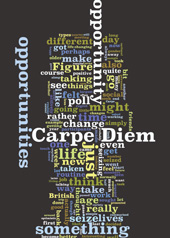Carpe Diem
— a report commissioned by The National Lottery
Introduction
Ask not — we cannot know — what end the gods have set for you, for me; nor attempt the Babylonian reckonings Leuconoë. How much better to endure whatever comes, whether Jupiter grants us additional winters or whether this is our last, which now wears out the Tuscan Sea upon the barrier of the cliffs! Be wise, strain the wine; and since life is brief, prune back far-reaching hopes! Even while we speak, envious time has passed: pluck the day, putting as little trust as possible in tomorrow!
— Quintus Horatius Flaccus (Horace) 68BC — Ode I-XI, Carpe Diem.
Earlier this year the Social Issues Research Centre undertook an in-depth study for The National Lottery of the extent to which a sense of optimism prevails in Britain, even in times of economic downturn and gloom-and-doom in the newspapers. To what extent are we characterised as nation by ‘always look on the bright side of life’? Or are we as a people more ‘mustn’t grumble’ types?
What we found was pleasantly surprising. A high level of optimism prevails in the country, even in difficult times. It is tempered, of course, by a degree caution at times – what we called ‘situational’ optimism – and our sense of optimism is focused primarily on our families, our personal relationships and our social life. While we tend to be upbeat about these matters, however, we are far less optimistic about the future of British society as a whole.
A question remained at the end of this study. If people are, in the main, generally optimistic, does this mean that they are people likely to seize opportunities wherever they find them in the belief that the outcomes will be positive? Or is the ability to ‘go for it’ – ‘to seize the day’ – a reflection of a different aspect of our make up?
And so we start at the top of this introduction with an extract from one of Horace’s famous odes – written over two thousand years ago but still very pertinent today. Being fond of agricultural metaphors, Horace issues the Latin exhortation at the end of this ode, ‘Carpe Diem’ – literally, ‘pluck the day’, but more often translated as ‘seize the day’. Were he living in the present time he might simply have said ‘let’s go for it’.
There is, of course, a sense in Horace’s ode – some might describe it as an elaborate chat-up line aimed at the evidently very pretty young Leuconoë – of irresponsibility: forget about tomorrow, think only of today. But carpe diem is really all about recognising opportunities when they are presented and taking them, rather than letting them simply slip by. We can think about the future, even put trust in it, but still make the most use of the opportunities afforded by the present.
It was against the rather unusual (for SIRC at least) Classics background that we carefully selected people from our extensive panel of focus group participants to be our initial guinea pigs. This, we felt, would start to give us insights into the extent to which people in general are opportunity-seekers and takers – the areas of their lives in which such opportunities are mostly seized and where, perhaps, they are either avoided or passed over.
This time, however, our participants would not only have to contribute to congenial discussions – they would have to go off and do something as well. They would create their own personal ‘carpe diems’ and report back a week later on the opportunities they had taken and what the results had been. The aim here was to see whether people could become more opportunity-taking than they normally were, and how this might influence what they did in both the short- and long-term future. In essence – a small-scale social experiment.
While the people we involve in focus groups come from a wide range of social backgrounds, professions and ages, they are not, of course, necessarily representative of the country as a whole. Following the first group meeting, therefore, we developed a set of questions that reflected the main themes arising in the discussions. These were administered online by YouGov to a nationally representative sample of 2,066 people across Britain.
The contributions of the group participants and their accounts of the opportunities they decided to seek out and to take are summarised in the following sections of this report along with key findings from the national survey.
Click here to access the full report in pdf format.






